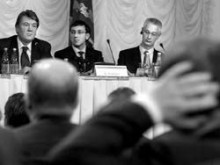Business and the government are partners. Politicians and entrepreneurs keep repeating this phrase like a mantra. At a roundtable entitled “Ukraine at the Crossroads?” held last Tuesday, business people claimed that things are finally changing.
On Nov. 29 President Yushchenko appeared before business people again, talking for the umpteenth time about cutting taxes, simplifying taxation, introducing a single social tax, and carrying out pension reform. In general, 2006 is going to be Ukraine’s year of indispensable reforms in education, land management, public health, perhaps in the court system, etc. As usual, we’ll get down to everything at once — God willing, at least one venture will be brought to its conclusion.
President Yushchenko again brought up the subject of corruption and said it was not the “Orange government” that brought it into Ukraine. “Our goal is to minimize bureaucratic meddling in the economy. To this end, we are repealing about 66 presidential decrees and around 150 cabinet resolutions. Instead, we are introducing about 250 laws of Ukraine. We will achieve this goal by Feb. 1,” the guarantor of the Constitution promised, broaching the problem of privatization. The businessmen’s faces brightened and their glances became warmer as the president said from the stage, “We recognize the privatization that occurred in the 1990s and the early 2000s. We are winding this up. Today, the state is the foremost protector of Ukrainian and foreign business.” Therefore, there will be no more “expropriation of expropriators.”
“Next year we intend to launch a public, auction-based privatization of strategic facilities, such as Ukrtelekom, Nikopol Ferroalloy Works, the Port of Odesa, etc.” Yushchenko reasoned out loud. He finally came to the conclusion that “whoever pays the most for a facility will work there.”
Nor did the head of state forget about the inflation rate (up to 10 percent this year and about 8-8.4 percent in 2006) or the GDP: the latter has stopped falling and will rise by 4-4.5 percent by the end of this year. Yushchenko must have said this to convince the audience that the business climate in Ukraine is warming up. Businessmen in turn wanted to know about amnesty on capital and guarantees for fairness and transparency in the upcoming parliamentary elections. The president noted that any amnesty on capital before the elections is out of the question because of the likelihood of political speculations. As for the elections, Yushchenko said there would be no more administrative pressure on voters. “Nobody is going to revert to the political regime that obstructed business and threatened the life of the people for 14 years,” the president said.
The business community seemed to be satisfied with the answers.
Ruslan KORZH, managing director, A. T. Karni CIS Company:
“Business and the government meet in order to review all standpoints and mutual expectations as well as to work out reciprocal demands. Earlier, there was too much euphoria, too many declarations and promises that were never kept. Now the government is keeping its eyes open and has taken a more pragmatic approach. This time no unrealistic promises were made. Today we saw a balance of what the government can do and what it plans to do and what the business community expects from it. This means, first of all, predictability and stability.”
Oleksandr KOLOSIUK, director, Ukrainian branch of Goodyear Dunlop Tires:
“The new Ukrainian government is trying to improve the business climate and boost the transparency of its actions. It is definitely on the right track, and we are trying to give it all kinds of support. Our business feels comfortable in Ukraine, but today it is important for us to assess Ukraine’s long-term prospects. We hope to continue a dialogue with the government. It would be good if the government knew how to properly present to business what it is doing, so that its policies and actions are open and clear to any businessman.”
Kamen ZAKHARIEV, Ukraine director of the European Bank for Reconstruction and Development:
“It is far more important to improve the investment climate than to amnesty capital. For even if I have been amnestied, my decision to return or not return money to Ukraine will depend on what I can do with this money here and on whether my money and property are reliably protected here. Therefore, the investment climate is a more crucial issue. We now have a more stable dialogue with the government and a better understanding of business requirements.”







